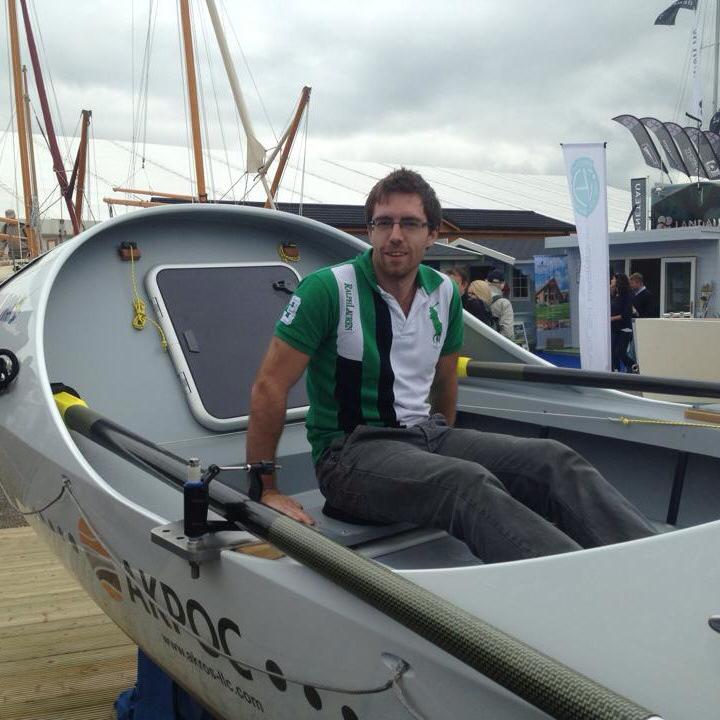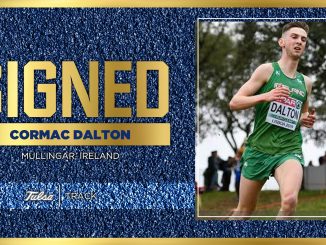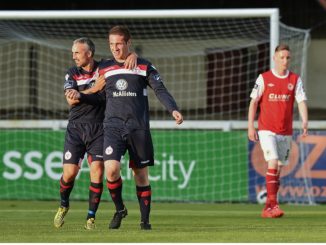
The Terrence Larkin lecture theatre on DCU campus is the most famous learning chamber in the university, largely because of its unquantifiable capacity. Other than catering for gargantuan module sizes, it is also the optimum location for some ‘extra-curricular’ reading without being noticed. This was certainly the case for one athlete in the university who used his classes in the theatre to become a rowing aficionado.
At Christmas 2009, then DCU student Philip Cavanagh found nestling under his evergreen conifer a copy of Paul Gleeson’s Little Lady One Man Big Ocean: Rowing the Atlantic. Gleeson, also an Irishman, told the story of two non-rowers who rowed a small boat in the Transatlantic Race. The narrative inspired Cavanagh, previously apathetic to rowing, into a monumental undertaking this summer.
As skipper of ‘Team Battleborn,’ Philip will skipper a team of four men into the inaugural Pacific Rowing Race this June which will begin in Monterey Bay, California and conclude 2100 miles away in the Hawaiian capital Honolulu.
Considering his recent introduction to the art of rowing, this putative undertaking could be seen as borderline madness and it raises one simple question: Why?
“I say to people ‘why not?’,” he tells The College View.
The team’s website gives a more revealing response: “I’ve always wanted to go to Hawaii, but the flights are extortionate so I’ve decided to row.”
Rowing will take a little longer than a jet, however, with a travel duration of roughly 40 days expected. Given the cramped conditions in which the team will operate for the duration of the race, selecting his teammates for this mammoth row was always going to be important.
“What I did for the selection criteria is I sent out an email via a friend, Alastair Humphreys the adventurer, and I had about 500 replies within a week about people looking to do it so there is a couple of mad people out there. I narrowed it down to a selection crew of about 15, met them and went out just to see how you spend a weekend together.”
Choosing his companions over a few pints rather than in a physically-testing environment, Cavanagh clearly values bonhomie over bravado.
“One of the most important aspects is that you get along; you’ve nowhere to go for six weeks. If you’ve a fight with the missus, you can go into another room for a while. We’re all on this small ocean boat.
“When I picked the team it was based on personality and not fitness. I actually had a guy who had cycled across the world looking to join the team. He flew over to Dublin and I knew after about 10 minutes that he wouldn’t slot in with what I was looking for,” the Palmerstown native says.
Rowing wasn’t an entirely novel idea to Philip Cavanagh, however. Being involved with athletics at a number of grades limited his ability to branch into the sport.
“I’d always wanted to do a row but with training six days a week I had put it in the back burner,” he says.
As a Computer Science student in DCU, Cavanagh actively competed for the campus athletics club over 800 and 1500 metres while also training in Chapelizod with the Donore Harriers club. With six days of training during his average week, Cavanagh aimed to achieve high but ultimately came up short by his own estimations. The gruelling task this summer may be an instance of atonement, then.
“I never really reached the heights I wanted to in Athletics and so if truth be told this is somewhat a chance of a redemption for me; a chance to prove to myself I can do something special.”
There is no question that a successful crossing this June would be Cavanagh’s Magnum Opus, in a sporting sense, but even completion of the course would be a tremendous achievement, considering the macabre nature of the Pacific Ocean.
“The weather is probably the biggest risk factor we have. People talk about sharks and all the rest but you’ve got more chance of getting hit by lightning. It can be quite treacherous out there. I asked a fellah who rowed across the Atlantic what he thought about the Pacific and he said it’s a different kettle of fish altogether.
“You won’t see land for roughly four to five weeks of the six-week challenge and you won’t see another team.”
It is easy to see from the way Cavanagh talks that his modus operandi is to prioritise the training of the mind, not just the body.
“The mental side is a lot more important. We reckon about 90 per cent is a mental challenge.
“We’re doing some sports psychology with a girl Karen Weekes down in Galway so we do that once every three weeks. That’ll get us mentally fit. Physically, we just need to keep ticking over. Training every day but just as normal so I think people are surprised when they realise that the physical aspect isn’t really as important as you’d imagine.”
However, the one burdensome challenge for the team’s physique will be gaining weight. One quarter of each man’s body mass will be lost during the race.
“One of the things I’m finding the hardest is to put on weight. From an athletics background, any 1800/1500 metre runner will tell you it’s quite hard to put on two stone especially when we only have four-and-a-half months until the race. Physically, the training is fine but it’s a lot more focused on weights than people would imagine.”
Cavanagh is attempting to be the first Irishman to row 2,100 miles of the Pacific Ocean in record time along with the coterie he has assembled. That being said, there are no delusions on his part about winning any battles against the force of nature that is the Pacific Ocean which is something that differs from the exuberance of his opponents’ websites.
“If you look at other people’s (websites) they go on about ‘conquering the pacific’. Absolute b****x, don’t make me laugh. Nobody is going to conquer the pacific. The ocean will decide whether you get across or not. We’re simply hoping for a safe crossing and the fastest one of the crews. World record holder has a nice ring to it doesn’t it?”
While charity will be the predominant beneficiary from the Pacific Race, Cavanagh hopes to inspire people to overcome their own personal difficulties as a result of their efforts in the water.
“We’re out to show that a lot of so-called ‘challenges’ are mental and not physical battles. I don’t just mean climbing Everest or rowing an ocean. Everyday tasks.
“People say ‘I can’t do this’ or ‘I wish I could do that’. F**k that, get it done. Whether it’s getting a job, studying for an exam, whatever. The barriers in front of you are put there by yourself, nobody else.”
The team’s target is to raise €100,000 in total while corporate sponsors in exchange for a logo are also welcomed. The money will go towards Irish Guide Dogs for the Blind, Aware and Cancer Research UK. The website pacificrow14.com can be accessed for further information or follow the team on Twitter @pacificrow14 and on Facebook through the Pacificrow14 page.
Eoin Sheahan
Image Credit: www.pacificrow14.com




Leave a Reply